Critical Evaluation: Talent Management in NHS England 2012-2018
VerifiedAdded on 2023/01/17
|53
|14290
|44
Capstone Project
AI Summary
This capstone dissertation project critically evaluates the effectiveness of talent management (TM) in NHS England from 2012 to 2018. The research explores the strategies and approaches adopted by NHS England during this period, analyzing their effectiveness in meeting organizational needs and identifying any constraints or challenges faced in implementation. The study employs a thematic analysis of qualitative data, focusing on themes such as talent retention, development, attraction, and acquisition, derived from interviews with managers. The research addresses key questions regarding the effectiveness of TM processes, potential improvements, the existence of current TM strategies, the impact of TM on the knowledge economy, and the management of talent pools within NHS England. The findings provide recommendations for improved talent management, aiming to support staff and address issues of leadership, succession planning, and operational productivity within the NHS.
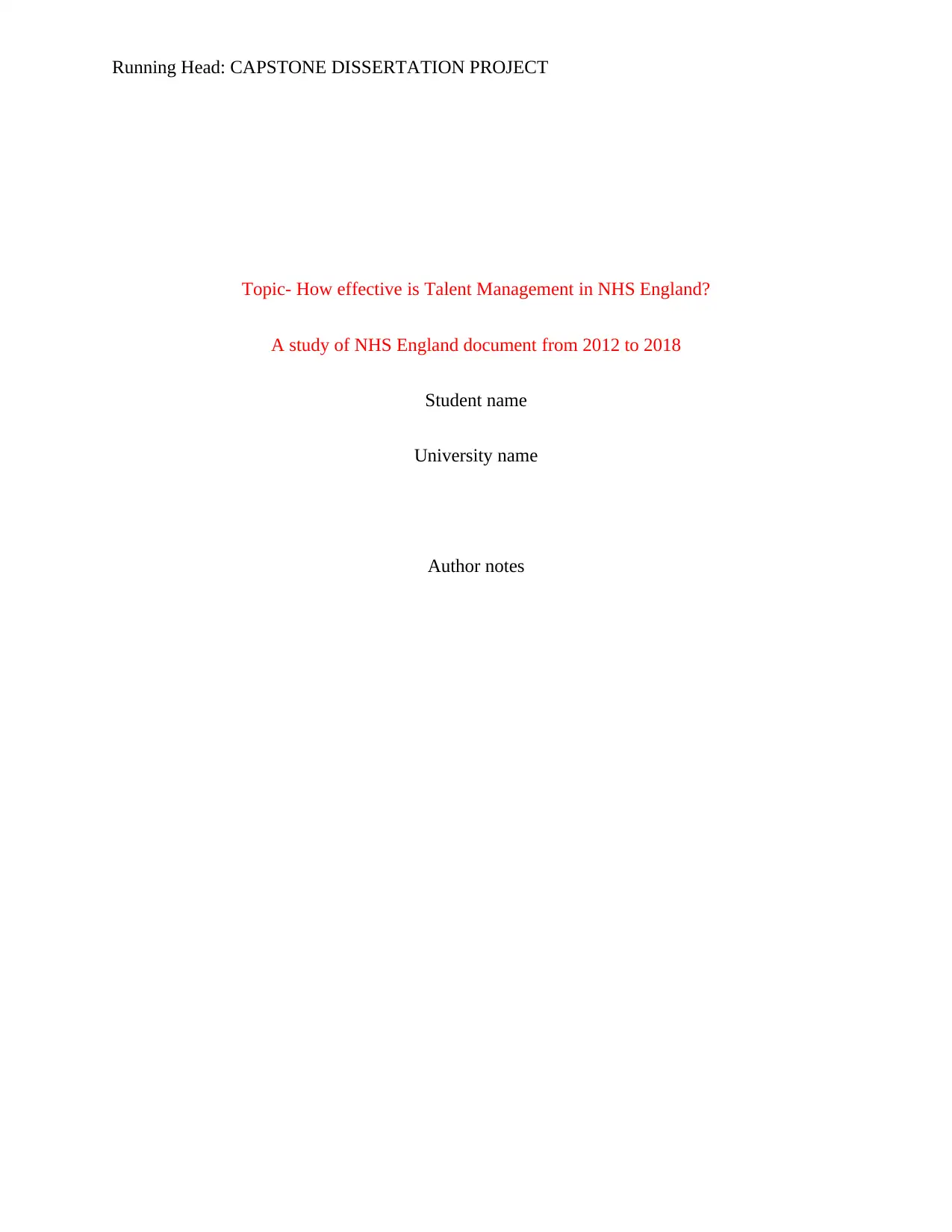
Running Head: CAPSTONE DISSERTATION PROJECT
Topic- How effective is Talent Management in NHS England?
A study of NHS England document from 2012 to 2018
Student name
University name
Author notes
Topic- How effective is Talent Management in NHS England?
A study of NHS England document from 2012 to 2018
Student name
University name
Author notes
Paraphrase This Document
Need a fresh take? Get an instant paraphrase of this document with our AI Paraphraser
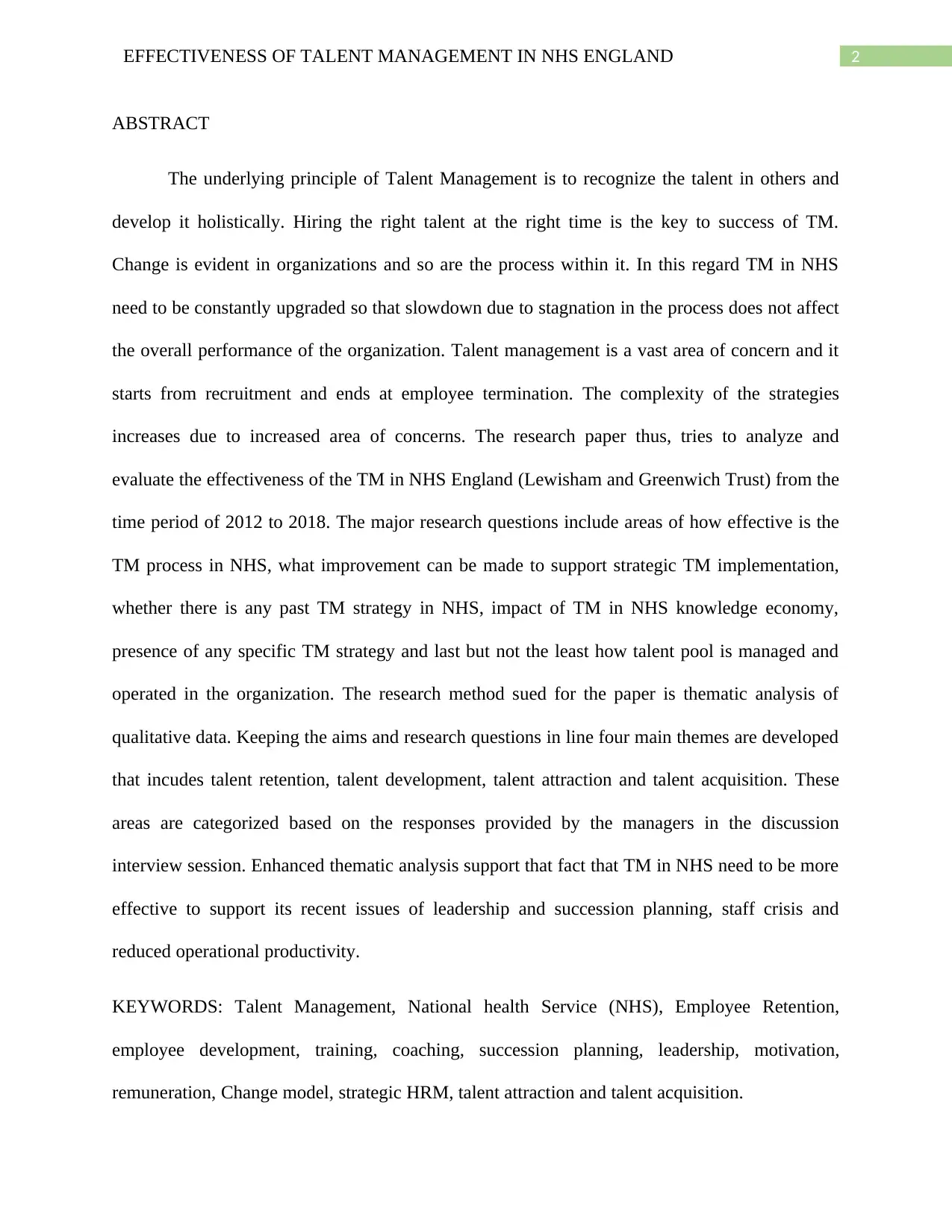
2EFFECTIVENESS OF TALENT MANAGEMENT IN NHS ENGLAND
ABSTRACT
The underlying principle of Talent Management is to recognize the talent in others and
develop it holistically. Hiring the right talent at the right time is the key to success of TM.
Change is evident in organizations and so are the process within it. In this regard TM in NHS
need to be constantly upgraded so that slowdown due to stagnation in the process does not affect
the overall performance of the organization. Talent management is a vast area of concern and it
starts from recruitment and ends at employee termination. The complexity of the strategies
increases due to increased area of concerns. The research paper thus, tries to analyze and
evaluate the effectiveness of the TM in NHS England (Lewisham and Greenwich Trust) from the
time period of 2012 to 2018. The major research questions include areas of how effective is the
TM process in NHS, what improvement can be made to support strategic TM implementation,
whether there is any past TM strategy in NHS, impact of TM in NHS knowledge economy,
presence of any specific TM strategy and last but not the least how talent pool is managed and
operated in the organization. The research method sued for the paper is thematic analysis of
qualitative data. Keeping the aims and research questions in line four main themes are developed
that incudes talent retention, talent development, talent attraction and talent acquisition. These
areas are categorized based on the responses provided by the managers in the discussion
interview session. Enhanced thematic analysis support that fact that TM in NHS need to be more
effective to support its recent issues of leadership and succession planning, staff crisis and
reduced operational productivity.
KEYWORDS: Talent Management, National health Service (NHS), Employee Retention,
employee development, training, coaching, succession planning, leadership, motivation,
remuneration, Change model, strategic HRM, talent attraction and talent acquisition.
ABSTRACT
The underlying principle of Talent Management is to recognize the talent in others and
develop it holistically. Hiring the right talent at the right time is the key to success of TM.
Change is evident in organizations and so are the process within it. In this regard TM in NHS
need to be constantly upgraded so that slowdown due to stagnation in the process does not affect
the overall performance of the organization. Talent management is a vast area of concern and it
starts from recruitment and ends at employee termination. The complexity of the strategies
increases due to increased area of concerns. The research paper thus, tries to analyze and
evaluate the effectiveness of the TM in NHS England (Lewisham and Greenwich Trust) from the
time period of 2012 to 2018. The major research questions include areas of how effective is the
TM process in NHS, what improvement can be made to support strategic TM implementation,
whether there is any past TM strategy in NHS, impact of TM in NHS knowledge economy,
presence of any specific TM strategy and last but not the least how talent pool is managed and
operated in the organization. The research method sued for the paper is thematic analysis of
qualitative data. Keeping the aims and research questions in line four main themes are developed
that incudes talent retention, talent development, talent attraction and talent acquisition. These
areas are categorized based on the responses provided by the managers in the discussion
interview session. Enhanced thematic analysis support that fact that TM in NHS need to be more
effective to support its recent issues of leadership and succession planning, staff crisis and
reduced operational productivity.
KEYWORDS: Talent Management, National health Service (NHS), Employee Retention,
employee development, training, coaching, succession planning, leadership, motivation,
remuneration, Change model, strategic HRM, talent attraction and talent acquisition.
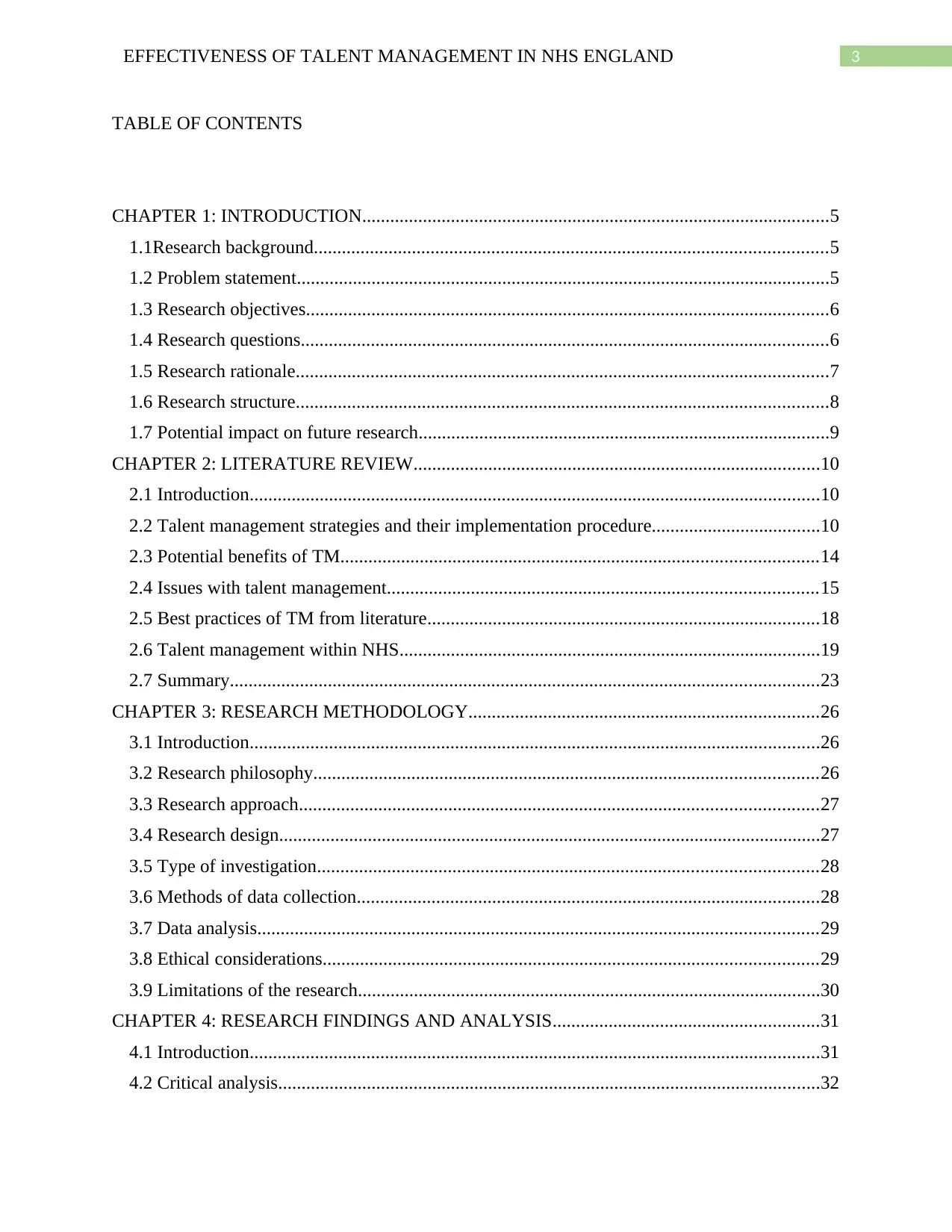
3EFFECTIVENESS OF TALENT MANAGEMENT IN NHS ENGLAND
TABLE OF CONTENTS
CHAPTER 1: INTRODUCTION....................................................................................................5
1.1Research background..............................................................................................................5
1.2 Problem statement..................................................................................................................5
1.3 Research objectives................................................................................................................6
1.4 Research questions.................................................................................................................6
1.5 Research rationale..................................................................................................................7
1.6 Research structure..................................................................................................................8
1.7 Potential impact on future research........................................................................................9
CHAPTER 2: LITERATURE REVIEW.......................................................................................10
2.1 Introduction..........................................................................................................................10
2.2 Talent management strategies and their implementation procedure....................................10
2.3 Potential benefits of TM......................................................................................................14
2.4 Issues with talent management............................................................................................15
2.5 Best practices of TM from literature....................................................................................18
2.6 Talent management within NHS..........................................................................................19
2.7 Summary..............................................................................................................................23
CHAPTER 3: RESEARCH METHODOLOGY...........................................................................26
3.1 Introduction..........................................................................................................................26
3.2 Research philosophy............................................................................................................26
3.3 Research approach...............................................................................................................27
3.4 Research design....................................................................................................................27
3.5 Type of investigation...........................................................................................................28
3.6 Methods of data collection...................................................................................................28
3.7 Data analysis........................................................................................................................29
3.8 Ethical considerations..........................................................................................................29
3.9 Limitations of the research...................................................................................................30
CHAPTER 4: RESEARCH FINDINGS AND ANALYSIS.........................................................31
4.1 Introduction..........................................................................................................................31
4.2 Critical analysis....................................................................................................................32
TABLE OF CONTENTS
CHAPTER 1: INTRODUCTION....................................................................................................5
1.1Research background..............................................................................................................5
1.2 Problem statement..................................................................................................................5
1.3 Research objectives................................................................................................................6
1.4 Research questions.................................................................................................................6
1.5 Research rationale..................................................................................................................7
1.6 Research structure..................................................................................................................8
1.7 Potential impact on future research........................................................................................9
CHAPTER 2: LITERATURE REVIEW.......................................................................................10
2.1 Introduction..........................................................................................................................10
2.2 Talent management strategies and their implementation procedure....................................10
2.3 Potential benefits of TM......................................................................................................14
2.4 Issues with talent management............................................................................................15
2.5 Best practices of TM from literature....................................................................................18
2.6 Talent management within NHS..........................................................................................19
2.7 Summary..............................................................................................................................23
CHAPTER 3: RESEARCH METHODOLOGY...........................................................................26
3.1 Introduction..........................................................................................................................26
3.2 Research philosophy............................................................................................................26
3.3 Research approach...............................................................................................................27
3.4 Research design....................................................................................................................27
3.5 Type of investigation...........................................................................................................28
3.6 Methods of data collection...................................................................................................28
3.7 Data analysis........................................................................................................................29
3.8 Ethical considerations..........................................................................................................29
3.9 Limitations of the research...................................................................................................30
CHAPTER 4: RESEARCH FINDINGS AND ANALYSIS.........................................................31
4.1 Introduction..........................................................................................................................31
4.2 Critical analysis....................................................................................................................32
⊘ This is a preview!⊘
Do you want full access?
Subscribe today to unlock all pages.

Trusted by 1+ million students worldwide
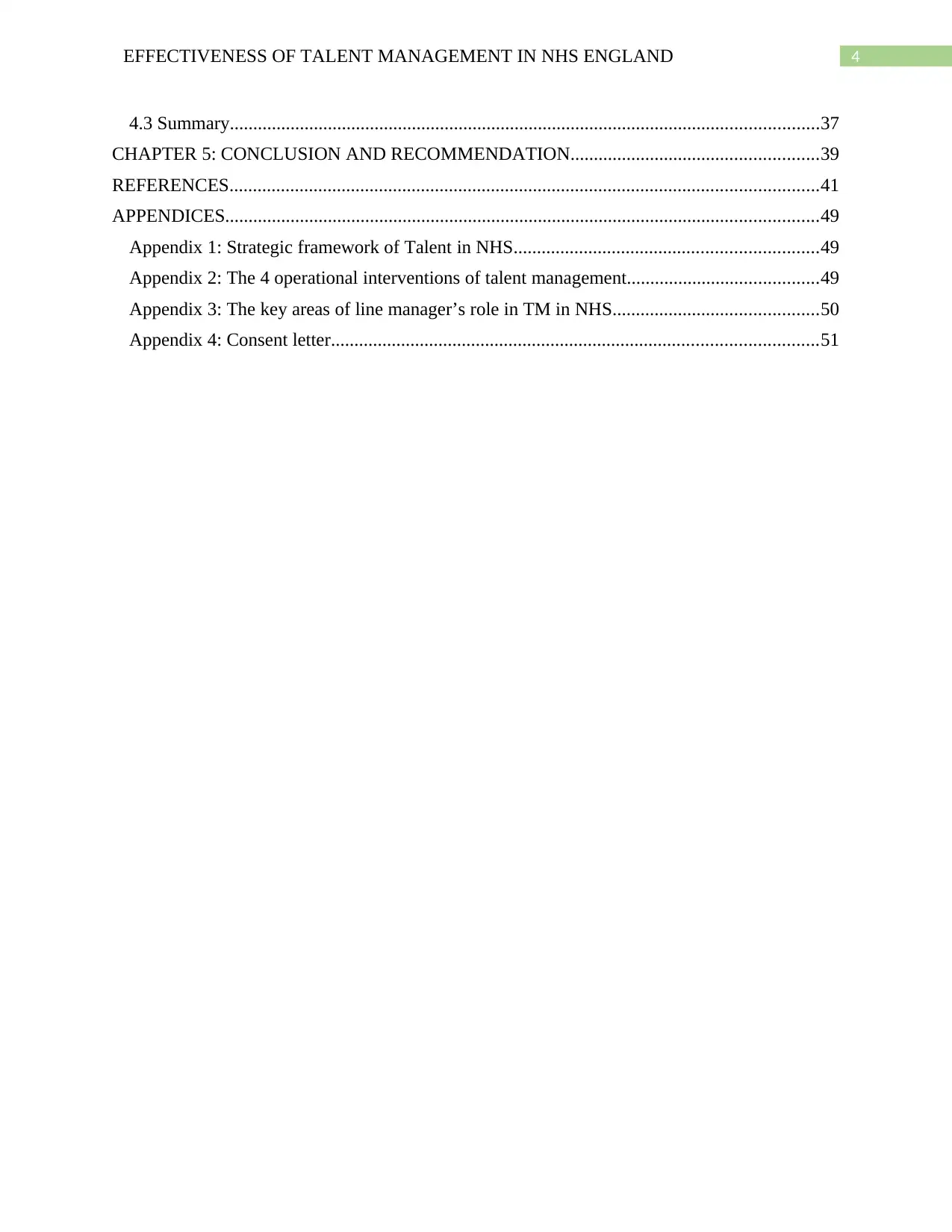
4EFFECTIVENESS OF TALENT MANAGEMENT IN NHS ENGLAND
4.3 Summary..............................................................................................................................37
CHAPTER 5: CONCLUSION AND RECOMMENDATION.....................................................39
REFERENCES..............................................................................................................................41
APPENDICES...............................................................................................................................49
Appendix 1: Strategic framework of Talent in NHS.................................................................49
Appendix 2: The 4 operational interventions of talent management.........................................49
Appendix 3: The key areas of line manager’s role in TM in NHS............................................50
Appendix 4: Consent letter........................................................................................................51
4.3 Summary..............................................................................................................................37
CHAPTER 5: CONCLUSION AND RECOMMENDATION.....................................................39
REFERENCES..............................................................................................................................41
APPENDICES...............................................................................................................................49
Appendix 1: Strategic framework of Talent in NHS.................................................................49
Appendix 2: The 4 operational interventions of talent management.........................................49
Appendix 3: The key areas of line manager’s role in TM in NHS............................................50
Appendix 4: Consent letter........................................................................................................51
Paraphrase This Document
Need a fresh take? Get an instant paraphrase of this document with our AI Paraphraser
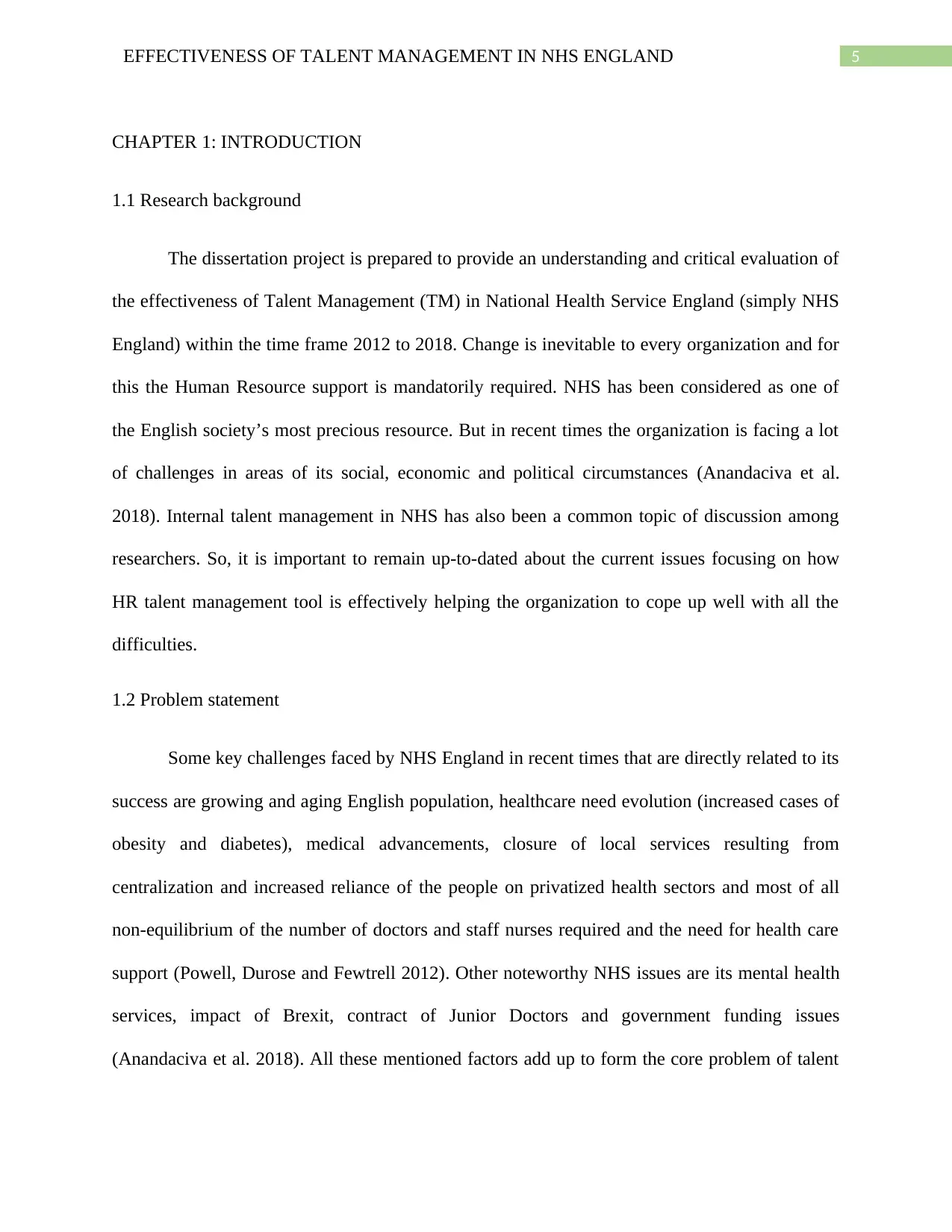
5EFFECTIVENESS OF TALENT MANAGEMENT IN NHS ENGLAND
CHAPTER 1: INTRODUCTION
1.1 Research background
The dissertation project is prepared to provide an understanding and critical evaluation of
the effectiveness of Talent Management (TM) in National Health Service England (simply NHS
England) within the time frame 2012 to 2018. Change is inevitable to every organization and for
this the Human Resource support is mandatorily required. NHS has been considered as one of
the English society’s most precious resource. But in recent times the organization is facing a lot
of challenges in areas of its social, economic and political circumstances (Anandaciva et al.
2018). Internal talent management in NHS has also been a common topic of discussion among
researchers. So, it is important to remain up-to-dated about the current issues focusing on how
HR talent management tool is effectively helping the organization to cope up well with all the
difficulties.
1.2 Problem statement
Some key challenges faced by NHS England in recent times that are directly related to its
success are growing and aging English population, healthcare need evolution (increased cases of
obesity and diabetes), medical advancements, closure of local services resulting from
centralization and increased reliance of the people on privatized health sectors and most of all
non-equilibrium of the number of doctors and staff nurses required and the need for health care
support (Powell, Durose and Fewtrell 2012). Other noteworthy NHS issues are its mental health
services, impact of Brexit, contract of Junior Doctors and government funding issues
(Anandaciva et al. 2018). All these mentioned factors add up to form the core problem of talent
CHAPTER 1: INTRODUCTION
1.1 Research background
The dissertation project is prepared to provide an understanding and critical evaluation of
the effectiveness of Talent Management (TM) in National Health Service England (simply NHS
England) within the time frame 2012 to 2018. Change is inevitable to every organization and for
this the Human Resource support is mandatorily required. NHS has been considered as one of
the English society’s most precious resource. But in recent times the organization is facing a lot
of challenges in areas of its social, economic and political circumstances (Anandaciva et al.
2018). Internal talent management in NHS has also been a common topic of discussion among
researchers. So, it is important to remain up-to-dated about the current issues focusing on how
HR talent management tool is effectively helping the organization to cope up well with all the
difficulties.
1.2 Problem statement
Some key challenges faced by NHS England in recent times that are directly related to its
success are growing and aging English population, healthcare need evolution (increased cases of
obesity and diabetes), medical advancements, closure of local services resulting from
centralization and increased reliance of the people on privatized health sectors and most of all
non-equilibrium of the number of doctors and staff nurses required and the need for health care
support (Powell, Durose and Fewtrell 2012). Other noteworthy NHS issues are its mental health
services, impact of Brexit, contract of Junior Doctors and government funding issues
(Anandaciva et al. 2018). All these mentioned factors add up to form the core problem of talent
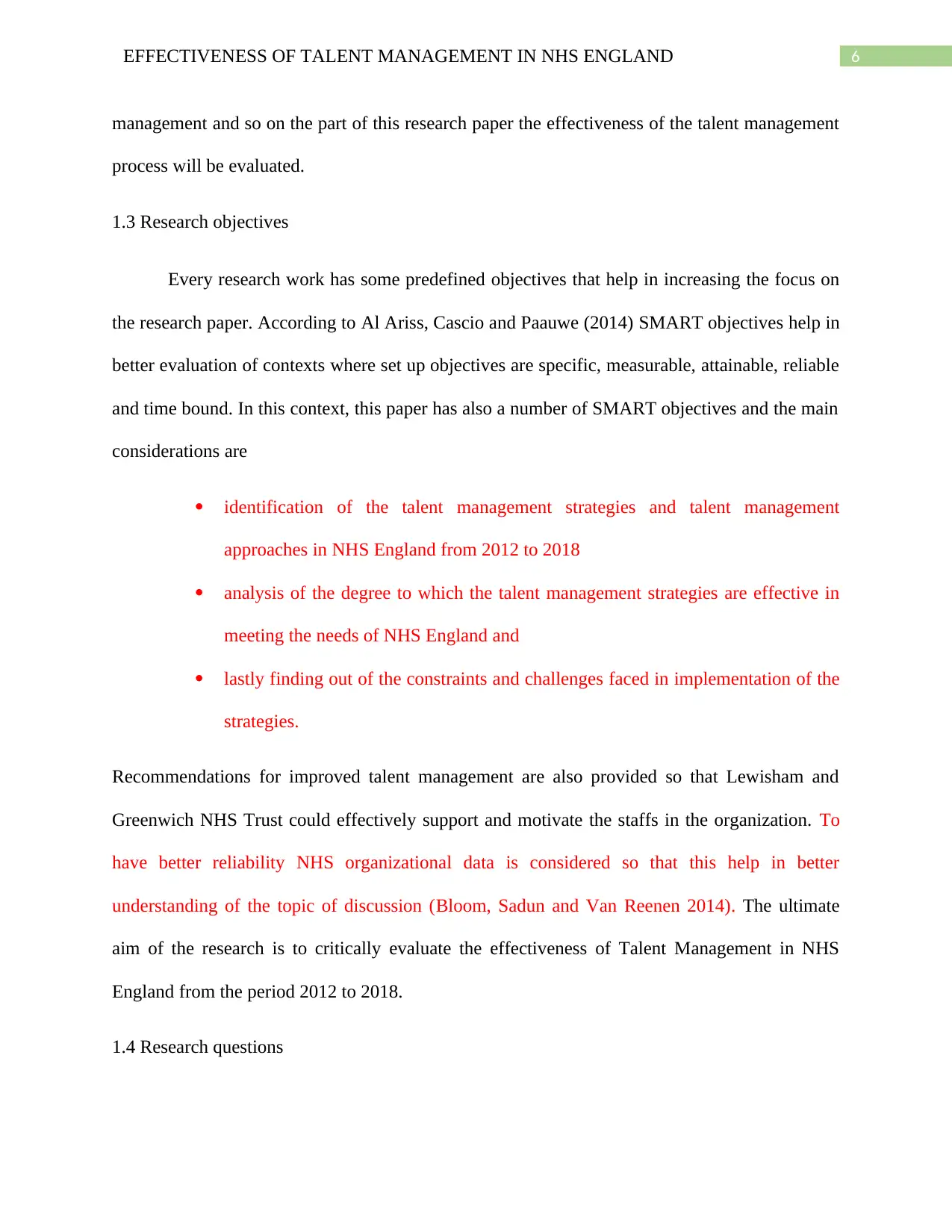
6EFFECTIVENESS OF TALENT MANAGEMENT IN NHS ENGLAND
management and so on the part of this research paper the effectiveness of the talent management
process will be evaluated.
1.3 Research objectives
Every research work has some predefined objectives that help in increasing the focus on
the research paper. According to Al Ariss, Cascio and Paauwe (2014) SMART objectives help in
better evaluation of contexts where set up objectives are specific, measurable, attainable, reliable
and time bound. In this context, this paper has also a number of SMART objectives and the main
considerations are
identification of the talent management strategies and talent management
approaches in NHS England from 2012 to 2018
analysis of the degree to which the talent management strategies are effective in
meeting the needs of NHS England and
lastly finding out of the constraints and challenges faced in implementation of the
strategies.
Recommendations for improved talent management are also provided so that Lewisham and
Greenwich NHS Trust could effectively support and motivate the staffs in the organization. To
have better reliability NHS organizational data is considered so that this help in better
understanding of the topic of discussion (Bloom, Sadun and Van Reenen 2014). The ultimate
aim of the research is to critically evaluate the effectiveness of Talent Management in NHS
England from the period 2012 to 2018.
1.4 Research questions
management and so on the part of this research paper the effectiveness of the talent management
process will be evaluated.
1.3 Research objectives
Every research work has some predefined objectives that help in increasing the focus on
the research paper. According to Al Ariss, Cascio and Paauwe (2014) SMART objectives help in
better evaluation of contexts where set up objectives are specific, measurable, attainable, reliable
and time bound. In this context, this paper has also a number of SMART objectives and the main
considerations are
identification of the talent management strategies and talent management
approaches in NHS England from 2012 to 2018
analysis of the degree to which the talent management strategies are effective in
meeting the needs of NHS England and
lastly finding out of the constraints and challenges faced in implementation of the
strategies.
Recommendations for improved talent management are also provided so that Lewisham and
Greenwich NHS Trust could effectively support and motivate the staffs in the organization. To
have better reliability NHS organizational data is considered so that this help in better
understanding of the topic of discussion (Bloom, Sadun and Van Reenen 2014). The ultimate
aim of the research is to critically evaluate the effectiveness of Talent Management in NHS
England from the period 2012 to 2018.
1.4 Research questions
⊘ This is a preview!⊘
Do you want full access?
Subscribe today to unlock all pages.

Trusted by 1+ million students worldwide
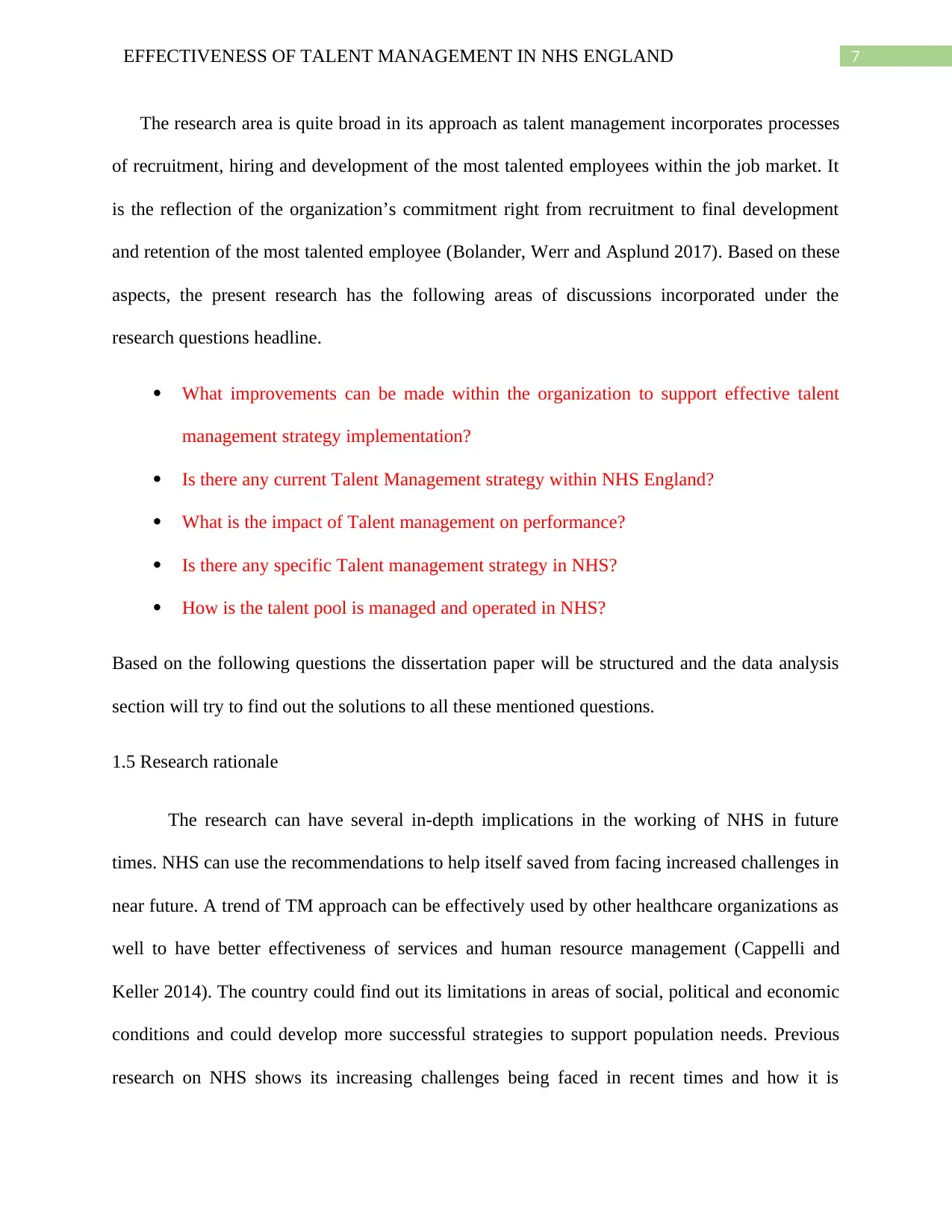
7EFFECTIVENESS OF TALENT MANAGEMENT IN NHS ENGLAND
The research area is quite broad in its approach as talent management incorporates processes
of recruitment, hiring and development of the most talented employees within the job market. It
is the reflection of the organization’s commitment right from recruitment to final development
and retention of the most talented employee (Bolander, Werr and Asplund 2017). Based on these
aspects, the present research has the following areas of discussions incorporated under the
research questions headline.
What improvements can be made within the organization to support effective talent
management strategy implementation?
Is there any current Talent Management strategy within NHS England?
What is the impact of Talent management on performance?
Is there any specific Talent management strategy in NHS?
How is the talent pool is managed and operated in NHS?
Based on the following questions the dissertation paper will be structured and the data analysis
section will try to find out the solutions to all these mentioned questions.
1.5 Research rationale
The research can have several in-depth implications in the working of NHS in future
times. NHS can use the recommendations to help itself saved from facing increased challenges in
near future. A trend of TM approach can be effectively used by other healthcare organizations as
well to have better effectiveness of services and human resource management (Cappelli and
Keller 2014). The country could find out its limitations in areas of social, political and economic
conditions and could develop more successful strategies to support population needs. Previous
research on NHS shows its increasing challenges being faced in recent times and how it is
The research area is quite broad in its approach as talent management incorporates processes
of recruitment, hiring and development of the most talented employees within the job market. It
is the reflection of the organization’s commitment right from recruitment to final development
and retention of the most talented employee (Bolander, Werr and Asplund 2017). Based on these
aspects, the present research has the following areas of discussions incorporated under the
research questions headline.
What improvements can be made within the organization to support effective talent
management strategy implementation?
Is there any current Talent Management strategy within NHS England?
What is the impact of Talent management on performance?
Is there any specific Talent management strategy in NHS?
How is the talent pool is managed and operated in NHS?
Based on the following questions the dissertation paper will be structured and the data analysis
section will try to find out the solutions to all these mentioned questions.
1.5 Research rationale
The research can have several in-depth implications in the working of NHS in future
times. NHS can use the recommendations to help itself saved from facing increased challenges in
near future. A trend of TM approach can be effectively used by other healthcare organizations as
well to have better effectiveness of services and human resource management (Cappelli and
Keller 2014). The country could find out its limitations in areas of social, political and economic
conditions and could develop more successful strategies to support population needs. Previous
research on NHS shows its increasing challenges being faced in recent times and how it is
Paraphrase This Document
Need a fresh take? Get an instant paraphrase of this document with our AI Paraphraser
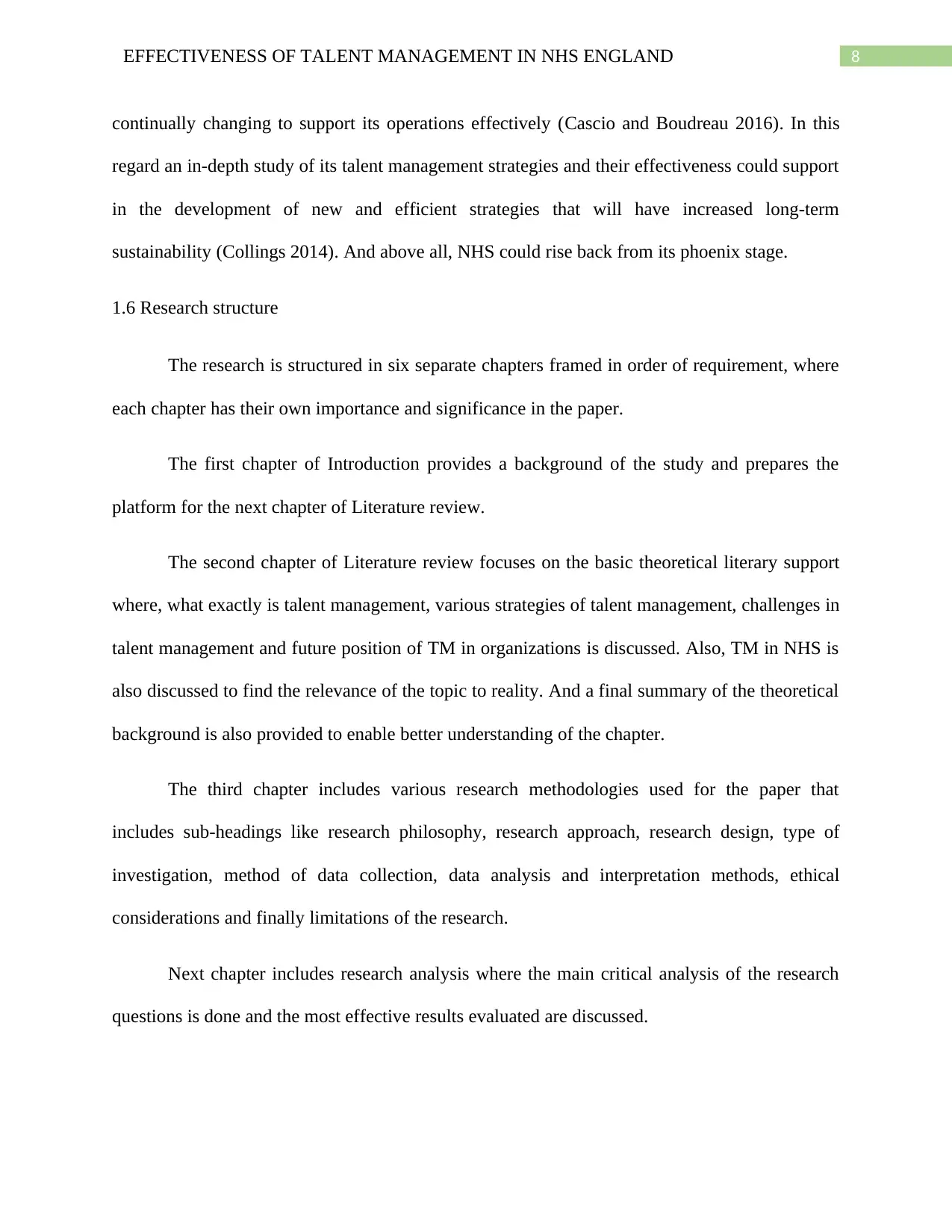
8EFFECTIVENESS OF TALENT MANAGEMENT IN NHS ENGLAND
continually changing to support its operations effectively (Cascio and Boudreau 2016). In this
regard an in-depth study of its talent management strategies and their effectiveness could support
in the development of new and efficient strategies that will have increased long-term
sustainability (Collings 2014). And above all, NHS could rise back from its phoenix stage.
1.6 Research structure
The research is structured in six separate chapters framed in order of requirement, where
each chapter has their own importance and significance in the paper.
The first chapter of Introduction provides a background of the study and prepares the
platform for the next chapter of Literature review.
The second chapter of Literature review focuses on the basic theoretical literary support
where, what exactly is talent management, various strategies of talent management, challenges in
talent management and future position of TM in organizations is discussed. Also, TM in NHS is
also discussed to find the relevance of the topic to reality. And a final summary of the theoretical
background is also provided to enable better understanding of the chapter.
The third chapter includes various research methodologies used for the paper that
includes sub-headings like research philosophy, research approach, research design, type of
investigation, method of data collection, data analysis and interpretation methods, ethical
considerations and finally limitations of the research.
Next chapter includes research analysis where the main critical analysis of the research
questions is done and the most effective results evaluated are discussed.
continually changing to support its operations effectively (Cascio and Boudreau 2016). In this
regard an in-depth study of its talent management strategies and their effectiveness could support
in the development of new and efficient strategies that will have increased long-term
sustainability (Collings 2014). And above all, NHS could rise back from its phoenix stage.
1.6 Research structure
The research is structured in six separate chapters framed in order of requirement, where
each chapter has their own importance and significance in the paper.
The first chapter of Introduction provides a background of the study and prepares the
platform for the next chapter of Literature review.
The second chapter of Literature review focuses on the basic theoretical literary support
where, what exactly is talent management, various strategies of talent management, challenges in
talent management and future position of TM in organizations is discussed. Also, TM in NHS is
also discussed to find the relevance of the topic to reality. And a final summary of the theoretical
background is also provided to enable better understanding of the chapter.
The third chapter includes various research methodologies used for the paper that
includes sub-headings like research philosophy, research approach, research design, type of
investigation, method of data collection, data analysis and interpretation methods, ethical
considerations and finally limitations of the research.
Next chapter includes research analysis where the main critical analysis of the research
questions is done and the most effective results evaluated are discussed.
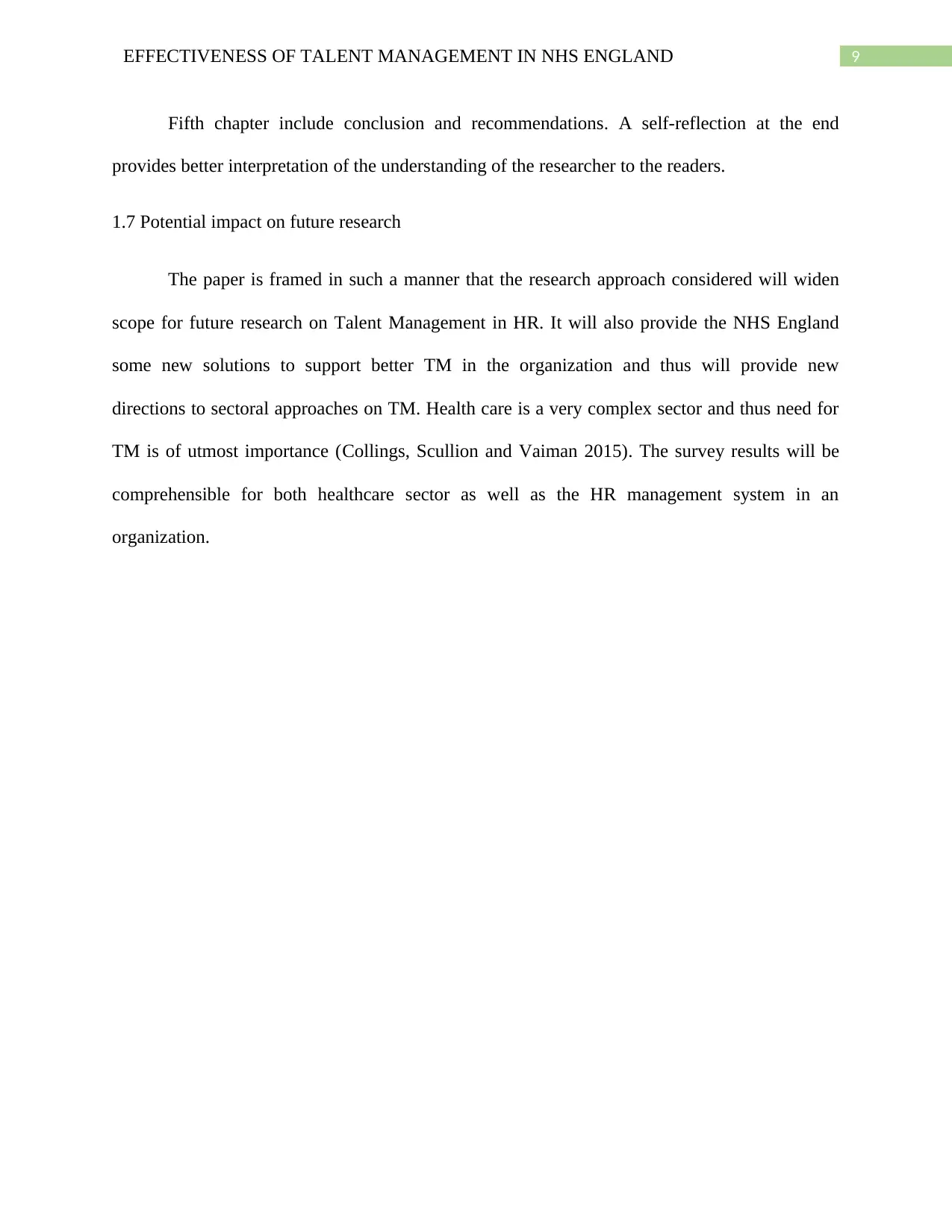
9EFFECTIVENESS OF TALENT MANAGEMENT IN NHS ENGLAND
Fifth chapter include conclusion and recommendations. A self-reflection at the end
provides better interpretation of the understanding of the researcher to the readers.
1.7 Potential impact on future research
The paper is framed in such a manner that the research approach considered will widen
scope for future research on Talent Management in HR. It will also provide the NHS England
some new solutions to support better TM in the organization and thus will provide new
directions to sectoral approaches on TM. Health care is a very complex sector and thus need for
TM is of utmost importance (Collings, Scullion and Vaiman 2015). The survey results will be
comprehensible for both healthcare sector as well as the HR management system in an
organization.
Fifth chapter include conclusion and recommendations. A self-reflection at the end
provides better interpretation of the understanding of the researcher to the readers.
1.7 Potential impact on future research
The paper is framed in such a manner that the research approach considered will widen
scope for future research on Talent Management in HR. It will also provide the NHS England
some new solutions to support better TM in the organization and thus will provide new
directions to sectoral approaches on TM. Health care is a very complex sector and thus need for
TM is of utmost importance (Collings, Scullion and Vaiman 2015). The survey results will be
comprehensible for both healthcare sector as well as the HR management system in an
organization.
⊘ This is a preview!⊘
Do you want full access?
Subscribe today to unlock all pages.

Trusted by 1+ million students worldwide
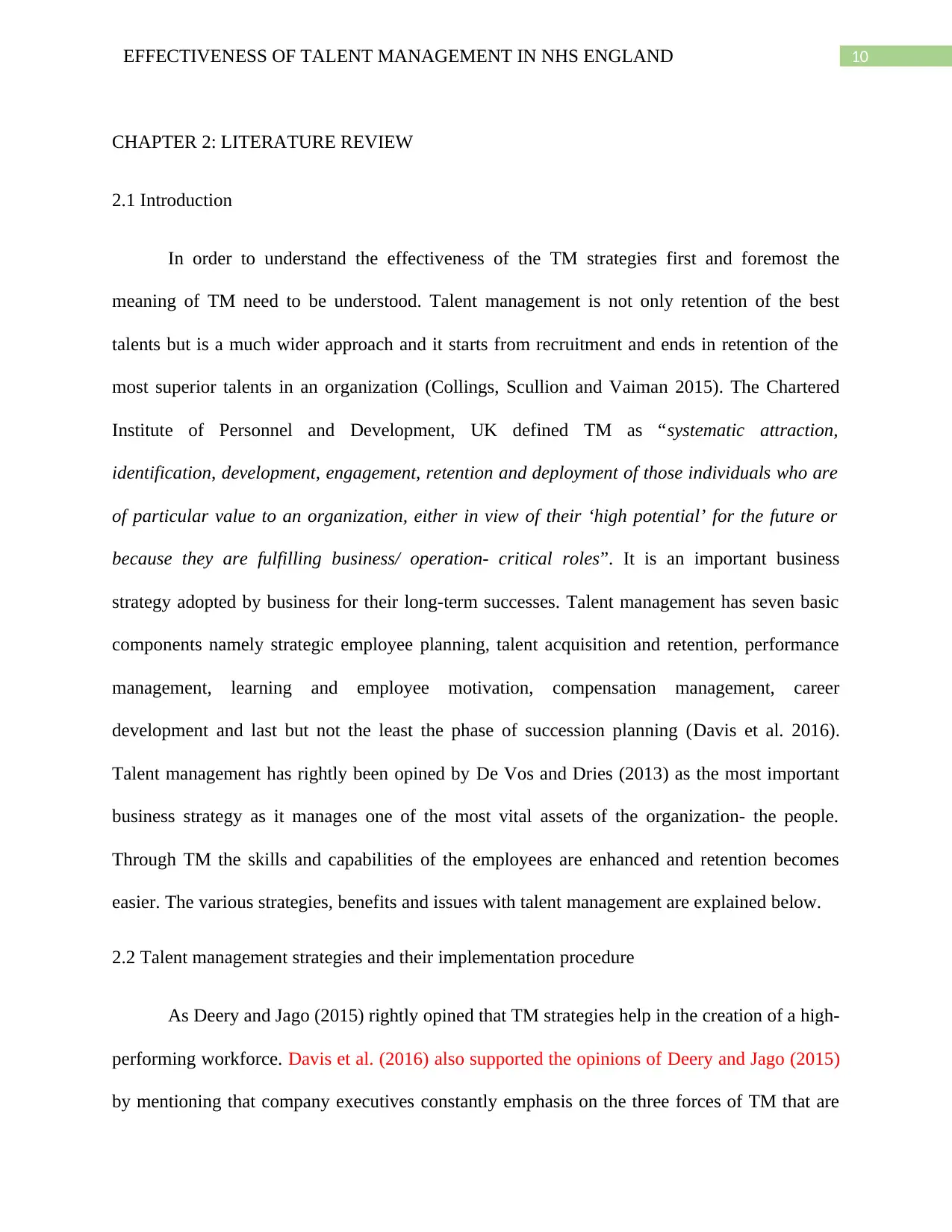
10EFFECTIVENESS OF TALENT MANAGEMENT IN NHS ENGLAND
CHAPTER 2: LITERATURE REVIEW
2.1 Introduction
In order to understand the effectiveness of the TM strategies first and foremost the
meaning of TM need to be understood. Talent management is not only retention of the best
talents but is a much wider approach and it starts from recruitment and ends in retention of the
most superior talents in an organization (Collings, Scullion and Vaiman 2015). The Chartered
Institute of Personnel and Development, UK defined TM as “systematic attraction,
identification, development, engagement, retention and deployment of those individuals who are
of particular value to an organization, either in view of their ‘high potential’ for the future or
because they are fulfilling business/ operation- critical roles”. It is an important business
strategy adopted by business for their long-term successes. Talent management has seven basic
components namely strategic employee planning, talent acquisition and retention, performance
management, learning and employee motivation, compensation management, career
development and last but not the least the phase of succession planning (Davis et al. 2016).
Talent management has rightly been opined by De Vos and Dries (2013) as the most important
business strategy as it manages one of the most vital assets of the organization- the people.
Through TM the skills and capabilities of the employees are enhanced and retention becomes
easier. The various strategies, benefits and issues with talent management are explained below.
2.2 Talent management strategies and their implementation procedure
As Deery and Jago (2015) rightly opined that TM strategies help in the creation of a high-
performing workforce. Davis et al. (2016) also supported the opinions of Deery and Jago (2015)
by mentioning that company executives constantly emphasis on the three forces of TM that are
CHAPTER 2: LITERATURE REVIEW
2.1 Introduction
In order to understand the effectiveness of the TM strategies first and foremost the
meaning of TM need to be understood. Talent management is not only retention of the best
talents but is a much wider approach and it starts from recruitment and ends in retention of the
most superior talents in an organization (Collings, Scullion and Vaiman 2015). The Chartered
Institute of Personnel and Development, UK defined TM as “systematic attraction,
identification, development, engagement, retention and deployment of those individuals who are
of particular value to an organization, either in view of their ‘high potential’ for the future or
because they are fulfilling business/ operation- critical roles”. It is an important business
strategy adopted by business for their long-term successes. Talent management has seven basic
components namely strategic employee planning, talent acquisition and retention, performance
management, learning and employee motivation, compensation management, career
development and last but not the least the phase of succession planning (Davis et al. 2016).
Talent management has rightly been opined by De Vos and Dries (2013) as the most important
business strategy as it manages one of the most vital assets of the organization- the people.
Through TM the skills and capabilities of the employees are enhanced and retention becomes
easier. The various strategies, benefits and issues with talent management are explained below.
2.2 Talent management strategies and their implementation procedure
As Deery and Jago (2015) rightly opined that TM strategies help in the creation of a high-
performing workforce. Davis et al. (2016) also supported the opinions of Deery and Jago (2015)
by mentioning that company executives constantly emphasis on the three forces of TM that are
Paraphrase This Document
Need a fresh take? Get an instant paraphrase of this document with our AI Paraphraser
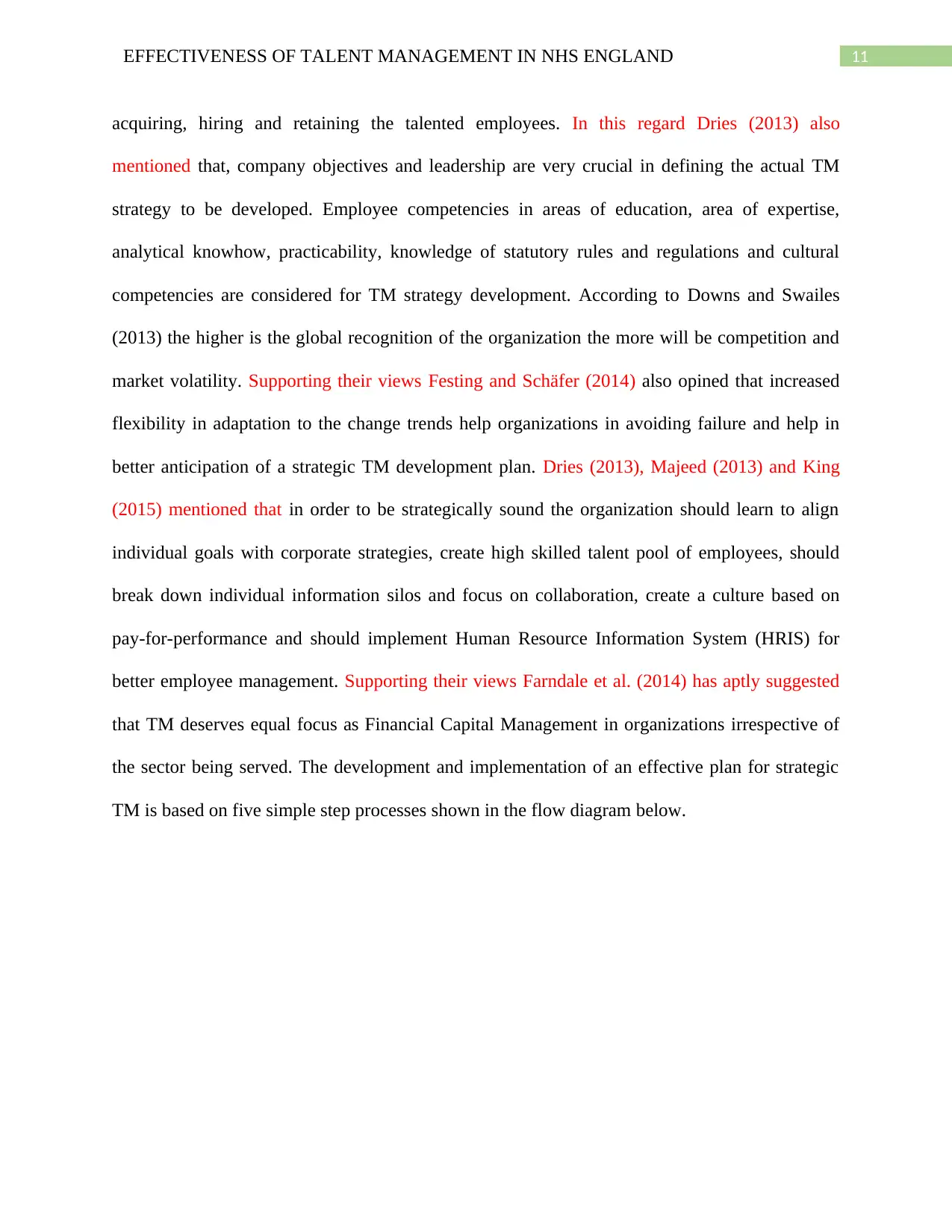
11EFFECTIVENESS OF TALENT MANAGEMENT IN NHS ENGLAND
acquiring, hiring and retaining the talented employees. In this regard Dries (2013) also
mentioned that, company objectives and leadership are very crucial in defining the actual TM
strategy to be developed. Employee competencies in areas of education, area of expertise,
analytical knowhow, practicability, knowledge of statutory rules and regulations and cultural
competencies are considered for TM strategy development. According to Downs and Swailes
(2013) the higher is the global recognition of the organization the more will be competition and
market volatility. Supporting their views Festing and Schäfer (2014) also opined that increased
flexibility in adaptation to the change trends help organizations in avoiding failure and help in
better anticipation of a strategic TM development plan. Dries (2013), Majeed (2013) and King
(2015) mentioned that in order to be strategically sound the organization should learn to align
individual goals with corporate strategies, create high skilled talent pool of employees, should
break down individual information silos and focus on collaboration, create a culture based on
pay-for-performance and should implement Human Resource Information System (HRIS) for
better employee management. Supporting their views Farndale et al. (2014) has aptly suggested
that TM deserves equal focus as Financial Capital Management in organizations irrespective of
the sector being served. The development and implementation of an effective plan for strategic
TM is based on five simple step processes shown in the flow diagram below.
acquiring, hiring and retaining the talented employees. In this regard Dries (2013) also
mentioned that, company objectives and leadership are very crucial in defining the actual TM
strategy to be developed. Employee competencies in areas of education, area of expertise,
analytical knowhow, practicability, knowledge of statutory rules and regulations and cultural
competencies are considered for TM strategy development. According to Downs and Swailes
(2013) the higher is the global recognition of the organization the more will be competition and
market volatility. Supporting their views Festing and Schäfer (2014) also opined that increased
flexibility in adaptation to the change trends help organizations in avoiding failure and help in
better anticipation of a strategic TM development plan. Dries (2013), Majeed (2013) and King
(2015) mentioned that in order to be strategically sound the organization should learn to align
individual goals with corporate strategies, create high skilled talent pool of employees, should
break down individual information silos and focus on collaboration, create a culture based on
pay-for-performance and should implement Human Resource Information System (HRIS) for
better employee management. Supporting their views Farndale et al. (2014) has aptly suggested
that TM deserves equal focus as Financial Capital Management in organizations irrespective of
the sector being served. The development and implementation of an effective plan for strategic
TM is based on five simple step processes shown in the flow diagram below.
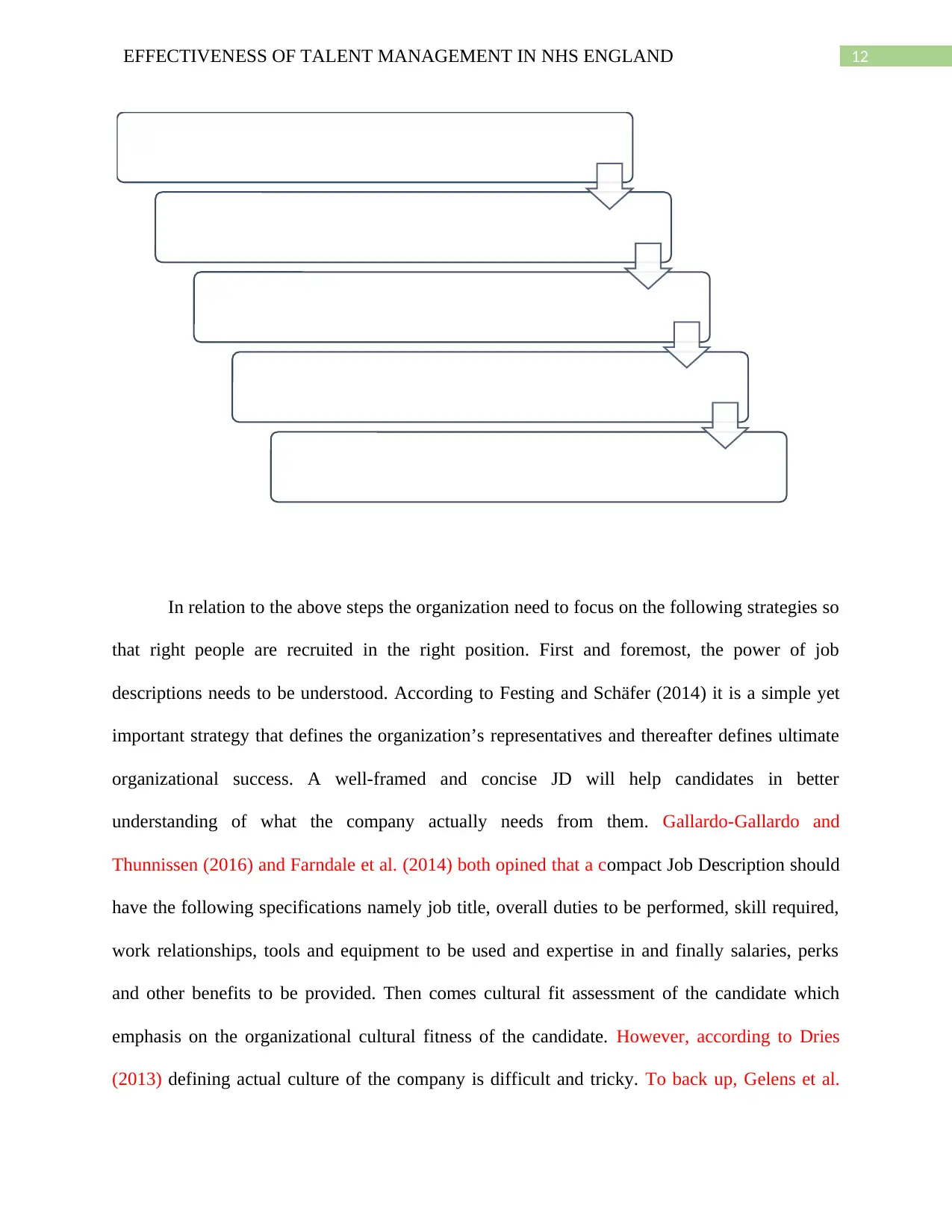
12EFFECTIVENESS OF TALENT MANAGEMENT IN NHS ENGLAND
In relation to the above steps the organization need to focus on the following strategies so
that right people are recruited in the right position. First and foremost, the power of job
descriptions needs to be understood. According to Festing and Schäfer (2014) it is a simple yet
important strategy that defines the organization’s representatives and thereafter defines ultimate
organizational success. A well-framed and concise JD will help candidates in better
understanding of what the company actually needs from them. Gallardo-Gallardo and
Thunnissen (2016) and Farndale et al. (2014) both opined that a compact Job Description should
have the following specifications namely job title, overall duties to be performed, skill required,
work relationships, tools and equipment to be used and expertise in and finally salaries, perks
and other benefits to be provided. Then comes cultural fit assessment of the candidate which
emphasis on the organizational cultural fitness of the candidate. However, according to Dries
(2013) defining actual culture of the company is difficult and tricky. To back up, Gelens et al.
Step1:Identification of organizatioanl goals and objectives
Step2: Identification of organziational drivers and challenges
Step3: Gap identification and analysis
Step4: Define HR priorities and Goals
Step5: Inventory support to talent management process, result
measurement and success communciation
In relation to the above steps the organization need to focus on the following strategies so
that right people are recruited in the right position. First and foremost, the power of job
descriptions needs to be understood. According to Festing and Schäfer (2014) it is a simple yet
important strategy that defines the organization’s representatives and thereafter defines ultimate
organizational success. A well-framed and concise JD will help candidates in better
understanding of what the company actually needs from them. Gallardo-Gallardo and
Thunnissen (2016) and Farndale et al. (2014) both opined that a compact Job Description should
have the following specifications namely job title, overall duties to be performed, skill required,
work relationships, tools and equipment to be used and expertise in and finally salaries, perks
and other benefits to be provided. Then comes cultural fit assessment of the candidate which
emphasis on the organizational cultural fitness of the candidate. However, according to Dries
(2013) defining actual culture of the company is difficult and tricky. To back up, Gelens et al.
Step1:Identification of organizatioanl goals and objectives
Step2: Identification of organziational drivers and challenges
Step3: Gap identification and analysis
Step4: Define HR priorities and Goals
Step5: Inventory support to talent management process, result
measurement and success communciation
⊘ This is a preview!⊘
Do you want full access?
Subscribe today to unlock all pages.

Trusted by 1+ million students worldwide
1 out of 53
Related Documents
Your All-in-One AI-Powered Toolkit for Academic Success.
+13062052269
info@desklib.com
Available 24*7 on WhatsApp / Email
![[object Object]](/_next/static/media/star-bottom.7253800d.svg)
Unlock your academic potential
Copyright © 2020–2026 A2Z Services. All Rights Reserved. Developed and managed by ZUCOL.




